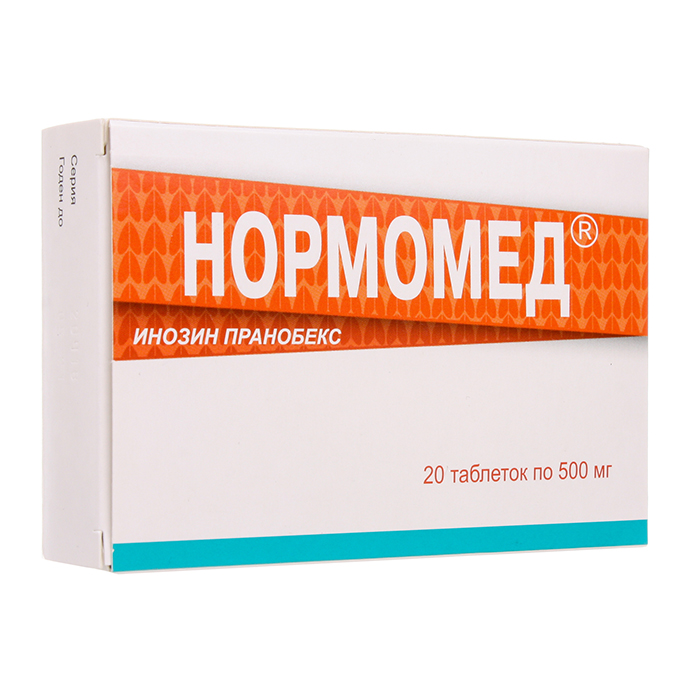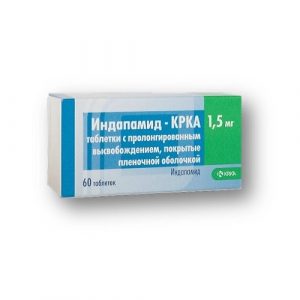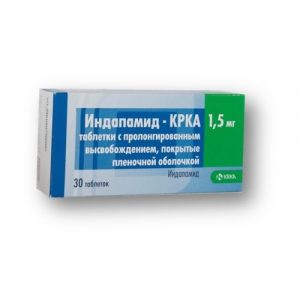Description
Release form
Tablets
Indications
Treatment of influenza and other acute respiratory viral infections
infections caused by herpes simplex virus type I and II: genital and labial herpes, herpes keratitis, chickenpox, shingles
infectious mononucleosis, Epstein-Barr virus-caused
cytomegalovirus infection
severe measles measles
papillomavirus infection: larynx / vocal cord papillomas (fibrous type), genital papillomavirus in men and women, sardosclerosis
Contraindications
Hypersensitivity to inosine praiobex and other components of the drug
gout
urolithiasis
chronic renal failure
arrhythmias
pregnancy and lactation
up to 15 kg (20 kg) children weight.
Caution
Caution should be exercised when given concomitantly with xaptin oxidase inhibitors, diuretics, zidovudine, in acute liver failure. Use during pregnancy and the period of breastfeeding Contraindicated in pregnant women and women who are breast-feeding, because the safety of the drug has not been investigated.
Special instructions
Consult a physician before starting treatment.
Normomed, like other antiviral agents, is most effective for acute viral infections if treatment is started at an early stage of the disease (preferably from the first day).
After 2 weeks of using the drug, you should monitor the concentration of uric acid in blood serum and urine.
With prolonged use after 4 weeks, it is advisable to monitor liver and kidney function every month (activity of ² Ñliver ² Ñ transaminases in blood plasma, creatinine, uric acid).
Patients with a significantly increased concentration of uric acid in the body can simultaneously take drugs that lower its concentration. In the lobby of the treatment, it is necessary to control the concentration of uric acid in the blood serum when prescribing the drug simultaneously with drugs that increase the concentration of uric acid or drugs that impair renal function.
Normomed should be used with caution in patients with acute liver failure, since the drug is metabolized in the liver.
Effect on the ability to drive vehicles or work with mechanisms
The effect of the drug on the rate of psychomotor reactions has not been investigated. When using the drug, the possibility of dizziness and drowsiness should be considered.
Dosing and Administration
Tablets are taken orally after a meal with a little water. The recommended daily dose for adults and children aged 3 years and older (body weight over 15-20 kg) is 50 mg / kg body weight in 3-4 doses, which is on average for adults – 6-8 tablets per day, for children – 1/2 tablet per 5 kg of body weight per day. In severe forms of infectious diseases, the dose can be individually increased up to 100 mg / kg body weight per day, divided into 4-6 doses. The maximum daily dose for adults is 3-4 g / day, for children aged 3 years and older – 50 mg / kg / day.
Duration of treatment:
In acute diseases, the duration of treatment in adults and children is usually 5 to 14 days. Treatment should be continued for 2 days after the disappearance of clinical symptoms. If necessary, the duration of treatment can be increased individually under the supervision of a physician.
In chronic relapsing diseases, treatment in adults and children is carried out in several courses lasting 5-10 days at intervals of 8 days. During maintenance therapy, the dose can be reduced to 500-1000 mg / day (1-2 tablets) for 30 days.
For herpetic infections, adults and children are prescribed for 5-10 days before the symptoms disappear, in the asymptomatic period, 1 tablet 2 times a day for 30 days to reduce the number of relapses.
For papillomavirus infection, adults are prescribed 2 tablets 3 times a day for children, 1/2 tablets per 5 kg / body weight per day in 3-4 doses for 14-28 days as monotherapy.
In case of cervical dysplasia associated with human papillomavirus, 2 tablets are prescribed 3 times a day for 10 days, then 2-3 similar courses are carried out with an interval of 10-14 days.
In case of recurrent genital warts, adults are prescribed 2 tablets 3 times a day, children – 1/2 tablet per 5 kg / body weight per day in 3-4 doses per day, either as mopotherapy or in combination with surgical treatment for 14-28 days, then with a three-fold repetition of the specified course at intervals of 1 month .
Use in elderly patients. The need for dose adjustment, the drug is used in the same way as in middle-aged patients. It should be borne in mind that in elderly patients, an increase in the concentration of uric acid in blood serum and urine is more likely than in middle-aged patients.
Use in patients with renal and hepatic insufficiency.
Against the background of treatment with Normomed, it is necessary to monitor the content of uric acid in blood serum and urine every 2 weeks. Monitoring the activity of liver enzymes is recommended every 4 weeks with long courses of treatment with the drug.
Side effects
The frequency of side effects after using the drug is classified according to WHO recommendations: frequent -> 1% and 0.1% and
From the nervous system: frequent – headache, dizziness, fatigue, feeling unwell, weakness infrequent – nervousness, drowsiness, insomnia.
From the gastrointestinal tract: frequent – decreased appetite, nausea, vomiting, epigastric pain infrequent – diarrhea, constipation.
From the liver and biliary tract: frequent temporary increase in the activity of transaminases and alkaline phosphatase in blood plasma, increased plasma urea concentration.
From the skin and subcutaneous tissues: frequent – itching, rash infrequent: maculopapular rash, urticaria, angioedema.
From the kidneys and urinary tract: infrequent – polyuria.
General disorders: frequent – joint pain, exacerbation of gout.
Laboratory and instrumental data: frequent – increased blood urea nitrogen concentration.
Drug Interactions
Immunosuppressants weaken the immunostimulating effect of the drug. The drug should be used with caution in patients taking simultaneously xytin oxidase inhibitors (allopurinol) or drugs that can block the kayaltsy secretion of uric acid, for example, “loop” diuretics (furosemide, torasemide, ethacryic acid), since this can lead to an increase in the concentration of uric acid in the blood serum.
The combined use of the drug with zidovudine leads to an increase in the concentration of the latter in blood plasma and lengthens its T1 / 2 (if used together, dose adjustment of zidovudine may be required).
Overdose
In case of overdose gastric lavage and symptomatic therapy are indicated.
Storage conditions
In the dark place at a temperature of no higher than 30 ° C.
Keep out of the reach of children.
Expiration
3 years.
Form of Treatment
syrup



